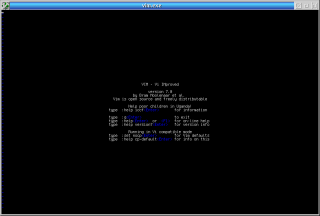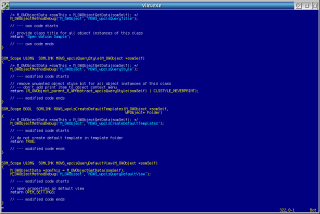Vim is an almost compatible version of the UNIX editor Vi. Many new features have been added.
Vi Improved (VIM)
Version:
7.4
Release date:
Saturday, 17 June, 2006
Home:
Categories:
License:
- GPL
Interface:
- VIO
Manual installation
Program is distributed as ZIP package: download to temporary directory and unpack to destination folder. See below for download link(s).
Following ones are the download links for manual installation:
| Vi Improved (VIM) v. 7.4 (9/9/2019, Alex Taylor) | Readme/What's new |
VIM 7.4 FOR OS/2
This is a binary build of Vi Improved version 7.4 for OS/2 systems. It has been
built using EMX 0.9d with GCC 2.81.
These binaries have the following notable changes from previous OS/2 builds (7.0
and lower):
- There is no dependency on any GCC runtime besides the EMX libraries.
- 'tee.exe' is not included, as most people will now be using the version from
GNU coreutils (included in the standard RPM/YUM distribution).
- The built-in terminal support is now selected when the TERM environment
variable is 'os2' (and not 'os2ansi' as before). The reason for this change
is that 'SET TERM=os2' is now widespread on OS/2 systems; this allows users
to use the standard VIM terminal settings without having to reconfigure their
terminal library settings, which is difficult to do.
The file 'vim74_os2emx.diff' contains a diff of all changes to the 'src' tree
from the standard VIM 7.4 source distribution.
To install:
1. Unzip vim74os2.zip to a directory in your PATH (e.g. D:\usr\local\bin)
2. Unzip vim74rt.zip to a directory of your choice (e.g. D:\usr\local\share),
and make sure the environment variable 'VIM' (alternatively 'VIMRUNTIME')
points to the 'vim74' subdirectory in this location, e.g.
SET VIM=D:\usr\local\share\vim74
The standard EMX runtime libraries are required. These are not provided here,
as they are available from numerous sources, and in fact are quite likely
installed on your system already. If not, they can be installed via YUM or
manually from http://hobbes.nmsu.edu/download/pub/os2/dev/emx/v0.9d/emxrt.zip
This build seems to work, but has not been heavily stress-tested. Needless to
say it is provided without warranty.
VIM is written by Bram Moolenaar. See README.txt for general information and
licensing terms. The OS/2 port was worked on by various people. Enter
":help os2" in the editor for more information specific to VIM on OS/2.
--
Alex Taylor
September 2019
http://altsan.org |
 www.hobbesarchive.com/Hobbes/pub/os2/apps/editors/Vim_7-4.zip www.hobbesarchive.com/Hobbes/pub/os2/apps/editors/Vim_7-4.zip |
||
| Executable v. 7.0 (17/6/2006, Bram Moolenaar) | Readme/What's new |
README_os2.txt for version 7.0 of Vim: Vi IMproved.
This file explains the installation of Vim on OS/2 systems.
See "README.txt" for general information about Vim.
NOTE: You will need two archives:
vim70rt.zip contains the runtime files (same as for the PC version)
vim70os2.zip contains the OS/2 executables
1. Go to the directory where you want to put the Vim files. Examples:
cd C:\
cd D:\editors
2. Unpack the zip archives. This will create a new directory "vim/vim70",
in which all the distributed Vim files are placed. Since the directory
name includes the version number, it is unlikely that you overwrite
existing files.
Examples:
pkunzip -d vim70os2.zip
unzip vim70os2.zip
After you unpacked the files, you can still move the whole directory tree
to another location.
3. Add the directory where vim.exe is to your path. The simplest is to add a
line to your autoexec.bat. Examples:
set path=%path%;C:\vim\vim70
set path=%path%;D:\editors\vim\vim70
That's it!
Extra remarks:
- To avoid confusion between distributed files of different versions and your
own modified vim scripts, it is recommended to use this directory layout:
("C:\vim" is used here as the root, replace with the path you use)
Your own files:
C:\vim\_vimrc Your personal vimrc.
C:\vim\_viminfo Dynamic info for 'viminfo'.
C:\vim\... Other files you made.
Distributed files:
C:\vim\vim70\vim.exe The Vim version 7.0 executable.
C:\vim\vim70\doc\*.txt The version 7.0 documentation files.
C:\vim\vim70\bugreport.vim A Vim version 7.0 script.
C:\vim\vim70\... Other version 7.0 distributed files.
In this case the $VIM environment variable would be set like this:
set VIM=C:\vim
- You can put your Vim executable anywhere else. If the executable is not
with the other distributed Vim files, you should set $VIM. The simplest is
to add a line to your autoexec.bat. Examples:
set VIM=c:\vim
set VIM=d:\editors\vim
For further information, type this inside Vim:
:help os2 |
 ftp.vim.org/pub/vim/os2/vim70os2.zip ftp.vim.org/pub/vim/os2/vim70os2.zip |
||
| Runtime v. 7.0 (, Bram Moolenaar) | Readme/What's new |
README.txt for version 7.0 of Vim: Vi IMproved.
WHAT IS VIM
Vim is an almost compatible version of the UNIX editor Vi. Many new features
have been added: multi-level undo, syntax highlighting, command line history,
on-line help, spell checking, filename completion, block operations, etc.
There is also a Graphical User Interface (GUI) available. See
"runtime/doc/vi_diff.txt" for differences with Vi.
This editor is very useful for editing programs and other plain ASCII files.
All commands are given with normal keyboard characters, so those who can type
with ten fingers can work very fast. Additionally, function keys can be
defined by the user, and the mouse can be used.
Vim currently runs under Amiga DOS, MS-DOS, MS-Windows 95/98/Me/NT/2000/XP,
Atari MiNT, Macintosh, BeOS, VMS, RISC OS, OS/2 and almost all flavours of
UNIX. Porting to other systems should not be very difficult.
DISTRIBUTION
There are separate distributions for Unix, PC, Amiga and some other systems.
This README.txt file comes with the runtime archive. It includes the
documentation, syntax files and other files that are used at runtime. To run
Vim you must get either one of the binary archives or a source archive.
Which one you need depends on the system you want to run it on and whether you
want or must compile it yourself. Check "http://www.vim.org/download.php" for
an overview of currently available distributions.
DOCUMENTATION
The best is to use ":help" in Vim. If you don't have an executable yet, read
"runtime/doc/help.txt". It contains pointers to the other documentation
files. The User Manual reads like a book and is recommended to learn to use
Vim. See ":help user-manual".
The vim tutor is a one hour training course for beginners. Mostly it can be
started as "vimtutor". See ":help tutor" for more information.
COPYING
Vim is Charityware. You can use and copy it as much as you like, but you are
encouraged to make a donation to orphans in Uganda. Please read the file
"runtime/doc/uganda.txt" for details (do ":help uganda" inside Vim).
Summary of the license: There are no restrictions on using or distributing an
unmodified copy of Vim. Parts of Vim may also be distributed, but the license
text must always be included. For modified versions a few restrictions apply.
The license is GPL compatible, you may compile Vim with GPL libraries and
distribute it.
SPONSORING
Fixing bugs and adding new features takes a lot of time and effort. To show
your appreciation for the work and motivate Bram and others to continue
working on Vim please send a donation.
Since Bram is back to a paid job the money will now be used to help children
in Uganda. See runtime/doc/uganda.txt. But at the same time donations
increase Bram's motivation to keep working on Vim!
For the most recent information about sponsoring look on the Vim web site:
http://www.vim.org/sponsor/
COMPILING
If you obtained a binary distribution you don't need to compile Vim. If you
obtained a source distribution, all the stuff for compiling Vim is in the
"src" directory. See src/INSTALL for instructions.
INSTALLATION
See one of these files for system-specific instructions:
README_ami.txt Amiga
README_unix.txt Unix
README_dos.txt MS-DOS and MS-Windows
README_os2.txt OS/2
README_mac.txt Macintosh
README_vms.txt VMS
INFORMATION
The latest news about Vim can be found on the Vim home page:
http://www.vim.org/
If you have problems, have a look at the Vim FAQ:
http://vimdoc.sf.net/vimfaq.html
Send bug reports to:
Bram Moolenaar <Bram@vim.org>
There are five mailing lists for Vim:
<vim@vim.org>
For discussions about using existing versions of Vim: Useful mappings,
questions, answers, where to get a specific version, etc.
<vim-dev@vim.org>
For discussions about changing Vim: New features, porting, beta-test
versions, etc.
<vim-announce@vim.org>
Announcements about new versions of Vim; also beta-test versions and
ports to different systems.
<vim-multibyte@vim.org>
For discussions about using and improving the multi-byte aspects of
Vim: XIM, Hangul, fontset, etc.
<vim-mac@vim.org>
For discussions about using and improving Vim on the Macintosh.
For more info and URLs of the archives see "http://www.vim.org/maillist.php".
NOTE:
- You can only send messages to these lists if you have subscribed!
- You need to send the messages from the same location as where you subscribed
from (to avoid spam mail).
- Maximum message size is 40000 characters.
If you want to join a maillist, send a message to
<vim-help@vim.org>
Make sure that your "From:" address is correct. Then the list server will
send you a help message.
MAIN AUTHOR
Send any other comments, patches, pizza and suggestions to:
Bram Moolenaar E-mail: Bram@vim.org
Molenstraat 2
2161 HP Lisse
The Netherlands
This is the address of my parents, they will forward mail and eat the pizza.
My actual address will change a couple of times in 2006. |
 ftp.vim.org/pub/vim/os2/vim70rt.zip ftp.vim.org/pub/vim/os2/vim70rt.zip |
Record updated last time on: 31/08/2025 - 09:59

This work is licensed under a Creative Commons Attribution 4.0 International License.


Comments
Tae
Sun, 02/06/2019 - 15:43
Permalink
The website is accessed via
gabriele
Mon, 03/06/2019 - 10:34
Permalink
Thanks Tae, corrected.
Add new comment